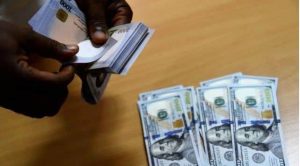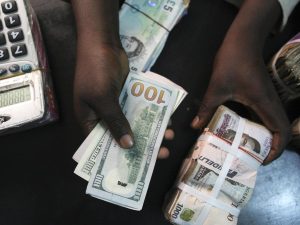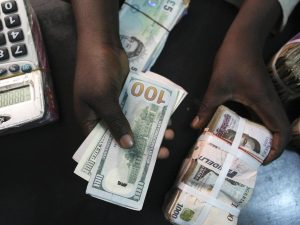
Experts have expressed concern as Nigeria’s currency, the Naira, continues its depreciation trend, with the exchange rate hitting ₦1,740/$1 in the parallel market after trading last weekend.
Naija News reports that the Naira exhibited stability with slight appreciation in the Nigerian Autonomous Foreign Exchange Market (NAFEM), as market participants speculate that the Central Bank of Nigeria (CBN) may intervene imminently to alleviate the pressure on the exchange rate.
Data from FMDQ indicated that the indicative exchange rate for NAFEM decreased to ₦1,600 per dollar from ₦1,601.2 per dollar last Thursday, reflecting a ₦1.2 appreciation for the Naira.
Traders who communicated with Vanguard over the weekend expressed expectations that the exchange rate may settle around ₦1,750/$1 by the end of this month, with projections for 2024 suggesting it could exceed ₦1,800/$1.
Should this trend persist, the local currency will have erased the gains it achieved in March of this year, when it experienced a significant appreciation, dropping from an all-time high of ₦1,820/$1 in February 2024 to ₦1,310/$1 and subsequently to ₦1,240/$1.
However, this appreciation was interrupted in April, leading to a sustained period of depreciation that continued until last week.
On a year-on-year basis, the Naira depreciated by 70.5 percent in the parallel market, closing at ₦1,705 per dollar at the end of third-quarter trading on September 30, 2024, compared to an average of ₦1,000/$1 in September 2023.
Year-to-date, the currency has depreciated by 16.7 percent from ₦1,490/$1 in January 2024.
The Naira experienced a significant year-on-year depreciation of 104% in the official segment, NAFEM, reaching ₦1540.78 per dollar in September 2024, compared to ₦755.27 in September 2023.
In contrast, the year-on-year depreciation for NAFEM was a more modest 9.9%, with the rate moving to N1600 per dollar last weekend from ₦1,455.9 per dollar in January 2024.
Market analysts and traders attribute the ongoing decline of the local currency to persistent supply shortages.
However, the monetary and fiscal authorities seem to have a different perspective on the issue.
During the recent Monetary Policy Committee (MPC) meeting, the Governor of the Central Bank of Nigeria, Mr. Yemi Cardoso, who also serves as the MPC Chairman, indicated that the committee had observed a link between the timing of FAAC disbursements and the demand pressures in the foreign exchange market.
He noted that the central bank will closely monitor future FAAC allocation disbursements to assess their effects on the foreign exchange market.
Cardoso stated: “Furthermore, members observed a strong correlation between FAAC releases and liquidity levels in the banking system as well as its impacts on the exchange rates.
“The committee, therefore, agreed to increase monitoring of future releases to address its effects on price development.”
This position creates the impression that fiscal actions have been undermining the exchange rate stability with demand pressures.
CBN’s View
Last week in Washington DC, during the recent World Bank Group annual meetings, Wale Edun, the Minister of Finance and Coordinating Minister of the Economy, stated that the primary issue facing Nigeria’s foreign exchange market is a lack of supply.
He emphasized that, as an oil-producing nation, Nigeria has the potential to resolve this issue by substantially enhancing its oil production levels.
He stated: “The key about the foreign exchange market really is supply and as you know, we are an oil-producing country, we just need to get our oil production up and that will deal with that issue of foreign exchange supply and pressure on foreign exchange anytime there are large flows.”
This suggests that the issue lies not in demand pressures from various sources but rather in insufficient supply.
In the meantime, foreign exchange dealers have indicated that the severe shortage, coupled with demand pressures, has brought the exchange rate close to the Central Bank of Nigeria’s (CBN) “fear index.”
They believe this situation will necessitate the apex bank to implement emergency measures, including increasing the volume of supply interventions involving all dealers to enhance foreign exchange liquidity.
These dealers also contend that such a response from the apex bank would help prevent further depreciation of the exchange rate and potentially stabilize it away from the fear zone.
Since August 8, the CBN has refrained from conducting retail Dutch foreign exchange auctions, which it had resumed in 2024, as the apex bank adopts a ‘minimal intervention’ strategy. Some dealers speculate that this approach is linked to the challenges posed by limited foreign exchange resources available to the bank.
Several dealers who spoke to Vanguard during the weekend noted that the anticipated intervention from the apex bank would be supported by a plan to pilot its new Automated FX Trading model next month.
This model, aimed at improving transparency and control within the market, is scheduled to be implemented in December, replacing a nearly decade-old over-the-counter trading system to enhance transparency and eliminate market distortions.
Meanwhile, CBN stated that the new system is intended to “facilitate a market-driven exchange rate accessible to the public.”
In a circular issued on October 2, 2024, which outlined the guidelines for the new system, the CBN stated: “This development is expected to reduce speculative activities, eliminate market distortions, and provide the CBN with improved oversight.”
The CBN announced a two-week test run in November, although specific dates were not provided.
Naija News observes that the existing depreciation rate is expected to position the Naira as the least effective currency globally in 2024.
In March 2024, the Federal Government lauded the significant appreciation of the Naira, highlighting that this development placed it among the top-performing currencies at that time.
Nevertheless, due to the resurgence of the depreciation trend, the World Bank recently classified the Naira as one of the poorest-performing currencies in sub-Saharan Africa.
Naira Depreciating Due To Dollar Rush
Several dealers provided insights to journalists regarding the conditions of the parallel market, particularly in relation to supply and demand in the official market.
They indicated that when major purchasers are unable to secure supplies from the official market, they turn to the black market as an alternative.
Furthermore, they noted that the supplies obtained from certain individuals linked to the official market can be challenging to acquire, resulting in a scarcity of US dollars and subsequently driving up the exchange rate.
Liasu Moshood, a black market trader, said: “The depreciation of Naira in the market is due to the rush for dollars by importers who don’t have access to the official foreign exchange market.
“There is less dollar supply everywhere and not all of us come to the market now because you can hardly get dollars you want to trade.
“These importers are sourcing large amounts of dollars from our market because those Bureau De Changes cannot meet their demands. Even the banks.”
On his part, Idris Daud, a trader, projected the dollar to close the month at ₦1,750 per dollar and end the year at ₦1,800 threshold. “Today, the dollar is sold between ₦1,730 and ₦1,740, especially by top foreign exchange black market dealers.
“The demand pressure now is high as more organizations are trying to import goods for the festive season in December and at the same time some are trying to restock before year-end as they are not certain what the foreign exchange rate might be before the end of the year. This is another reason for the pressure.
“There are also fewer inflows of foreign exchange going to our end, and we end up with little supply.
“I foresee the naira closing this month at ₦1,750 against the dollar and in the next three months at ₦1,800 per dollar on the back of continued pressure on demand and supply factor.”
The post Concerns As Naira Continues Fall Against US Dollar, Hits ₦1,740/$1 In Parallel Market appeared first on Naija News.
Discover more from Smlblogtv
Subscribe to get the latest posts sent to your email.



